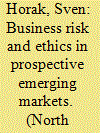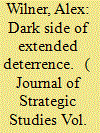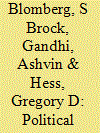|
|
|
Sort Order |
|
|
|
Items / Page
|
|
|
|
|
|
|
| Srl | Item |
| 1 |
ID:
124581


|
|
|
|
|
| Publication |
2013.
|
| Summary/Abstract |
urpose-This article discusses ethical issues of doing business with the Democratic People's Republic of Korea (North Korea) and associated risks in the area of sports sponsorship.
Design/methodology/approach-Ethical questions influence an international firm's engagement in North Korea in significant ways. Starting from a theoretical anchorage in business ethics, I apply descriptive case study methodology based on media analysis in order to understand ethical challenges of business management with North Korea by the example of firms from developed economies and emerging economies. This article is suitable to be used as a teaching case in international business and management classes (teaching notes are available on request from the author at sven.horak@gmx.de).
Findings-The study leads to three major propositions. International investors may benefit from first mover advantages in the area of sports sponsoring. On the contrary, breach of contract risks are high and a doubtful image of the sponsoring firm may be created in the eyes of the consumer while sponsoring a dictatorship. Moreover, the article finds indications that business transactions between two emerging markets appear to be smoother than between emerging markets and developed economies.
Originality/value-Only a few international firms are maintaining business relations with North Korea. If the new leadership opens up the country for international investors as proclaimed, international firms need to understand the prevailing business environment. In this context, the link between business ethics and associated risks has been rarely discussed since leadership change in 2011.
|
|
|
|
|
|
|
|
|
|
|
|
|
|
|
|
| 2 |
ID:
157894


|
|
|
|
|
| Summary/Abstract |
States employ extended deterrence to shield third parties from aggression. The concept is traditionally applied to interstate relations, collective security arrangements, and strategic considerations. The protective relationship that exists between a state sponsor of terrorism and its non-state militant proxy is rarely considered. This article will introduce and explore the sponsor–proxy relationship in the context of extended deterrence, and relate it to Iran’s support and sponsorship of political violence, militancy, and terrorism in Europe. The article reviews the rationale states have for sponsoring terrorism, and illustrates the promises and pitfalls associated with extending deterrence to non-state militants.
|
|
|
|
|
|
|
|
|
|
|
|
|
|
|
|
| 3 |
ID:
169446


|
|
|
|
|
| Summary/Abstract |
This article explores the nexus between immigration of highly-skilled persons and economic growth in the Arab Gulf states, until now a significantly understudied topic. It is argued that long-term growth primarily stems from technological progress and the article conducts a qualitative analysis of the degree to which the group of highly skilled migrants contributes to technological progress. The paper focusses on the United Arab Emirates (UAE) but reflects general issues pertaining to the Arab Gulf states. It concludes that the policy framework that manages the migration system, the so-called Kafala (sponsorship) system, indeed has positive effects, namely that it ensures that all migrants are in employment and the skills of the migrants complement rather than overlap with the skills of the locals. However, asymmetric power balance between sponsor and migrant, the built-in inflexibility in relation to job mobility, and the lack of a broader sense of inclusion in the hosting country all diminish the contribution of the highly-skilled migrants to these economies. A culture of transience prevails which leads to short term thinking, less innovation and less likelihood of entrepreneurship. Finally, the article finds that due to demographic realities, lack of incentives for the migrants to pursue knowledge transfer and the general educational level in society, transfer of technology most likely takes place from one migrant to the next, thereby bypassing the local population.
|
|
|
|
|
|
|
|
|
|
|
|
|
|
|
|
| 4 |
ID:
110008


|
|
|
|
|
| Publication |
2011.
|
| Summary/Abstract |
This paper presents an empirical analysis of what drives congressional legislation on terrorism during the period 1995 to 2010. We utilize and augment current methodology to compile and analyze data on sponsorship and cosponsorship of terrorism related data. Our results on the sources of legislation on terrorism are largely in line with past examinations of the importance of committee membership and leadership, party majority-ship, and other political factors. Further, we find that the most significant and robust drive for legislation on terrorism is the September 11th attacks. And while the impact of 9/11 affected legislative productivity everywhere, we find that it most significantly affected states surrounding New York and Washington D.C. Our results indicate that the economy may be one factor motivating politicians to legislate on terrorism; however, these results are not robust.
|
|
|
|
|
|
|
|
|
|
|
|
|
|
|
|
| 5 |
ID:
144169


|
|
|
|
|
| Summary/Abstract |
This essay revisits the much-discussed swarm of protests surrounding the 1996 Miss World pageant in Bangalore, India. It suggests that behind the clamour of clashing opinions regarding the content of the pageant lay a deeper crisis, uninterrogated yet constantly palpable: the absence of a performative dispensation within which the then-nascent project of liberalisation could, paradoxically, be experienced as self-grounding. By organising its discussion around interviews with some of the people most directly involved in trying to manage the meaning of the event – through sponsorship, public relations, policing, and protest – the essay shows how a reconsideration of the pageant can help us understand the delicate relation between commercial publicity and sovereign authority in a globalising age.
|
|
|
|
|
|
|
|
|
|
|
|
|
|
|
|
|
|
|
|
|